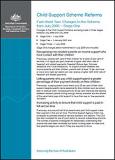Fact sheet Two: Changes to the Scheme from July 2006 - Stage One
Attachments

Changes to the Child Support Scheme are being made in three stages between July 2006 and July 2008.
- Stage One - 1 July 2006
- Stage Two - 1 January 2007 and
- Stage Three - 1 July 2008.
Stage One changes were implemented in July 2006 and included:
Recognising non-resident parents on income support who have contact with their children
Previously, parents with care of their children for at least 30 per cent of the time (110 nights per year) received a higher 'with child' rate of Newstart and related payments (Newstart Mature Age, Sickness Allowance and Youth Allowance). To support contact between low income parents and their children, parents with at least 14 per cent care or more (one night per week) can now receive a higher 'with child' rate of Newstart and related payments.
Letting parents who pay child support spend a greater percentage of their payment directly on their children
Previously, a paying parent could direct up to 25 per cent of their child support towards specific items essential for their children such as school fees or medical costs. Increasing this to 30 per cent improves the balance between resident parents having enough money available and the wishes of the parent who pays child support to have their say on how payments are spent.
Increasing activity to ensure that child support is paid in full and on time
Previously, only around half of all parents who paid child support made their payment in full and on time. The Child Support Agency (CSA) has increased its activities aimed at 'serious avoiders' and debtors. The CSA has also increased its use of court action to recover outstanding amounts. The number of parents investigated for deliberately understating their income has also been increased and action is being taken to make sure that parents lodge a tax return if they are required to do so.
Introducing a more balanced assessment of the capacity of parents to earn income
Parents can be required to pay additional child support (or be entitled to receive less) if the CSA determines they have a higher capacity to earn. Previously, this could happen even when there were legitimate changes to their circumstances. For example, a payer may have needed to work less because of new caring responsibilities or they may have lost their job - however, they may still have been required to pay child support based on their previous level of income.
This change limits the circumstances under which a parent's income can be decreased for child support assessment purposes. Decision makers now have extra guidance to improve the consistency and clarity of their decisions.
Reducing maximum payments
Australian research shows that under the previous formula, parents on higher incomes paid child support in excess of the cost of their children. The new child support formula (from 1 July 2008) brings payments in-line with research into the costs of raising children.
As an interim measure, from July 2006 to June 2008, the amount of income above which no additional child support was payable was reduced from $139,347 to $104,702 - this amount was indexed. During this time, higher income earners still paid substantial amounts of child support. For example, a paying parent with earnings greater than the new cap, whose child support payments started in 2006, and who had little contact with his or her two children (both under 12 years), still paid around $24,600 per annum in child support.
For more information see Fact sheet Ten: The new child support formula and the costs of children.
Improving support for separating families
A range of new and expanded services to help parents agree on arrangements for their children after separation, including child support matters, have been introduced. Parents can access information, professional advice and support through services such as the new Family Relationship Centres, the Family Relationship Advice Line and other expanded services.
For more information visit Family Relationships Online.
Improving service delivery by the CSA
The CSA has improved the way it does business. A more customer-focused approach includes improved training, more staff and more intensive case management for complex cases.
Increasing minimum payments
The previous $5 per week minimum payment is indexed yearly to the Consumer Price Index (CPI) so that it keeps pace with inflation. For child support periods beginning in 2008, the minimum payment is $6.50 per week. For more information see Fact sheet Twelve: Minimum payments.
Please note this fact sheet is for general guidance only. It should not be treated as a complete or authoritative legal statement.
More details about these changes can be found in other fact sheets and on the Child Support Agency website.
More information on the Taskforce and how the reforms started is available on this website under Ministerial Taskforce on Child Support.
Last updated:
